One of the groundsmen at the creaking old Coliseum managed a sad smile as he fulfilled a clutch of last wishes for mourning Oakland Athletics fans last Thursday. He scooped up little piles of dirt from the baseball diamond in his giant shovel and funnelled them carefully into the plastic bottles and cups and bags they held out for him.
‘This might be harder than my two divorces,’ one A’s fan told a San Francisco Chronicle reporter as he sat and watched his team beat the Texas Rangers in its final game before the Athletics were ripped away from Oakland, after 56 years in the city, to begin their relocation to Las Vegas.
There were tears and tributes and songs and demonstrations and protests on a day that dripped with nostalgia and burned with sorrow, anger and regret at the betrayal of a fanbase. ‘This is the worst of what sports can be,’ the ESPN anchor Scott van Pelt told the channel’s viewers.
There are many things that are wonderful about American sport, things that make them utterly addictive and enthralling and inspiring, but their occasional readiness to accept the relocation of their teams to new cities at the whim of their owners – usually for financial benefit, of course – is not one of them.
It is part of the reason why a shudder goes through me every time I hear suits at American broadcasting giant NBC saying they have their sights set on persuading our clubs to play two games on the opening weekend of a Premier League season in the United States. It is something, they say, that they are ‘pushing for’.
Calls continue to come for Premier League matches to be held abroad – particularly in the USA
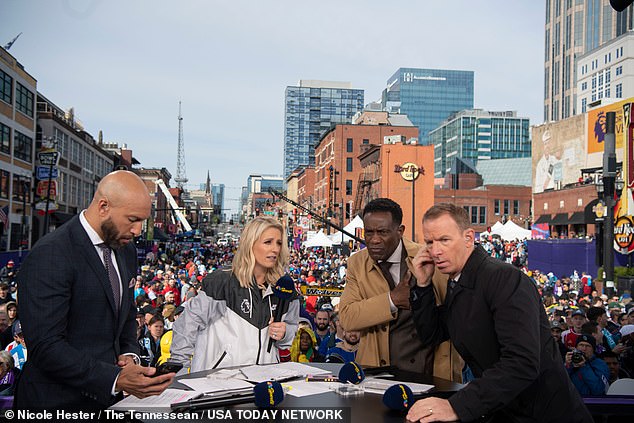
American broadcasting giants NBC have their sights set on persuading clubs to play two home games on the opening weekend in the States
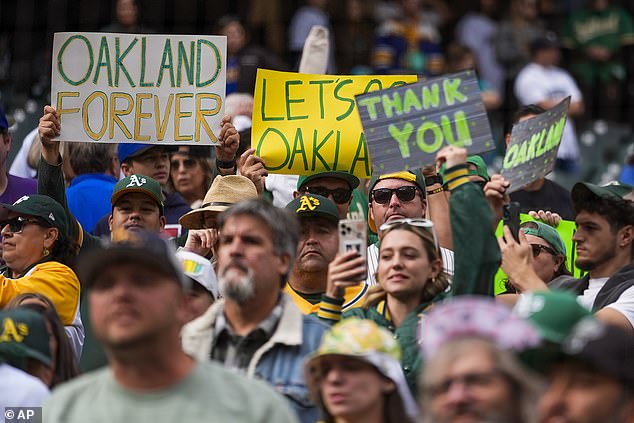
Oakland Athletics fans protested and cried during their final game in Oakland before the team heads to Las Vegas
NBC pays $2billion (£1.5bn) to broadcast Premier League matches in the States and that kind of money talks. They float the idea every so often – the last time was in an interview with The Athletic in May – and Richard Masters, the Premier League’s chief executive, admitted ‘the door was ajar’.
Decoded, that means the league would absolutely love to do it. They’re slavering at the idea of it and the extra revenue it would bring in and extra profile it would create in an expanding market.
They’d do it tomorrow if they weren’t scared of the outrage it would provoke among English supporters who have been ripped off enough times already by clubs who care little about their interests.
I hate the idea of our clubs ever playing a league match abroad. I hated it when one of Masters’ predecessors, Richard Scudamore, proposed his absurd 39th Game idea 16 years ago and I hate it now.
I don’t get it. Not on any level, except as a cynical sop to the greed of the clubs. Increasingly, we are being told that fans abroad love the English game as much as we do in this country and therefore they deserve to be able to watch games staged in the US, China, Malaysia or wherever as much as we deserve to watch them at Stamford Bridge, Old Trafford or Goodison Park.
Some, laughably, accuse those of us implacably opposed to the idea of league matches abroad of xenophobia when actually, it is the opposite of that.
One of my ambitions in life is to see Boca Juniors play River Plate but I have absolutely no interest in seeing that game at Wembley Stadium or at the Bernabeu or at the MetLife Stadium in New Jersey.
Part of the thrill of watching football is the importance the game has to different cultures. The magic of football, the thing that sucks you in, that really gets you, is a confluence of emotions. It’s not just the 90 minutes. It’s the environment, the stadium, the history, the streets, the people. You don’t get any of that by transplanting a match to a foreign field.
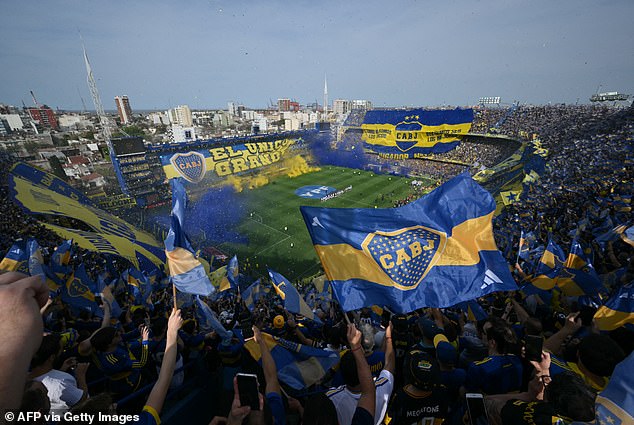
Watching Boca Juniors play River plate at anywhere but Buenos Aires, for example, would not be the same
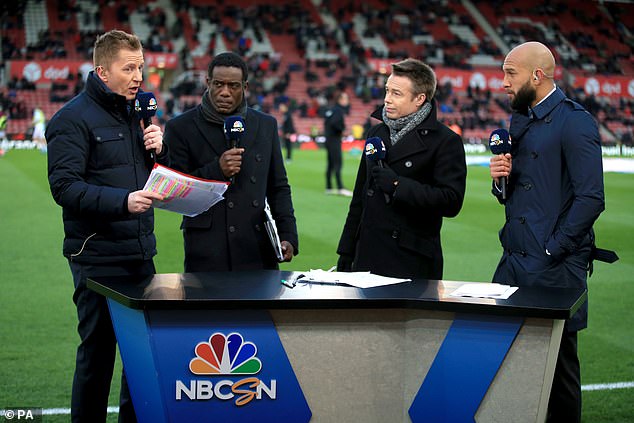
NBC pays $2billion (£1.5bn) to broadcast Premier League matches in the States and that kind of money talks
The only place to experience Boca Juniors-River Plate is in Buenos Aires. If I ever get the chance, I want to see it at La Bombonera, preferably. Failing that, then at the Monumental. Anywhere else and you rip the character away from it. You tear the essence out of it. It’s not the same.
I want to see the Dallas Cowboys play at the AT&T Stadium in Arlington. I want to see the cheerleaders marching out to Thunderstruck. I want to watch the game with Texans. I want to get a feel for what goes into making the Cowboys America’s Team.
That applies to baseball, too. A couple of the high points of my life watching sport have been seeing the Boston Red Sox play at Fenway Park and the Chicago Cubs at Wrigley Field. I’d watch them if they played in England, too, but it wouldn’t carry the same thrill. Sport, deracinated, is not really sport at all.
And what about the harm playing Premier League games in the States does to Major League Soccer? What kind of message does it send out about your domestic league if there is an obsession with bringing regular-season English club matches to the US? Why not try to build your own league to the point where English fans want to come to the States to see your teams?
I know the NFL have made a success of playing regular season games in London and Germany and, this season, in Brazil. They have a different fan culture. Away support is not as much of a thing. If it works for them, that’s fine, but I still don’t think it’s right.
And it won’t be right when the Premier League plays its first game abroad, either. It’ll happen because if there’s enough money involved and the broadcasters shout loudly enough, it always happens. But it’ll still be a betrayal of our football culture.
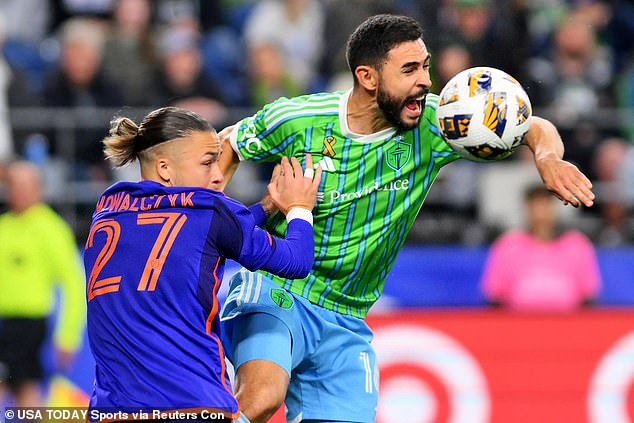
Premier League games played in the States could also do major hard to Major League Soccer
And who knows where it will lead? It might start with a couple of games between clubs outside the so-called Bix Six in New York or Miami. But it won’t end there. Once English football crosses the Rubicon, more and more games will follow.
The examples of other sports that have followed this path suggests mission creep, too. If baseball can move the Giants from New York to San Francisco and the Athletics from Oakland to Las Vegas, then perhaps one day someone will think the time is right to move Chelsea to Los Angeles.
You may think it fanciful now but once we’ve played a few league games in New York or Beijing or Seattle or Kuala Lumpur, it’ll soon be on the agenda, I promise you.
I went to the Coliseum once to watch the A’s. It was a while back on a family holiday. San Francisco was cold and wreathed in mist that summer, as it so often is, but my son and I took the train out to Oakland and by the time we got to the game, the stadium was wreathed in sunshine.
We bought a couple of hats in the green and gold of the A’s. They were too big for us to wear so they have hung on door handles at home ever since. Once, they were souvenirs. Now they are relics of a team that died.
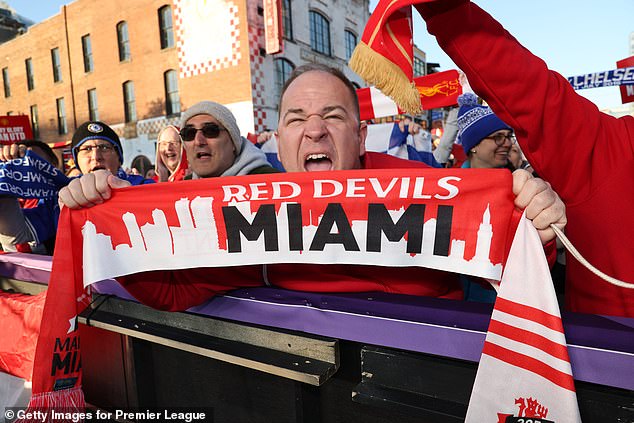
It could start with a couple of games in the country, but more and more would surely follow
Nothing knee-jerk about Ten Hag
Manchester United were briefing to media outlets on Monday that they would not be making any ‘knee-jerk’ decisions about the future of Erik ten Hag in the aftermath of their shocking performance in the defeat by Spurs.
The reality, of course, is that there would be nothing ‘knee-jerk’ about firing a manager who led United to an eighth-place finish in the Premier League last season and who has frittered away more than £600million to build a team going backwards.
United’s all-star executive team may be trying to give the impression of wisdom with their lofty stance but all they are really doing is trying to camouflage their indecision. Knee-jerk? Come on. Snails move more quickly than this.
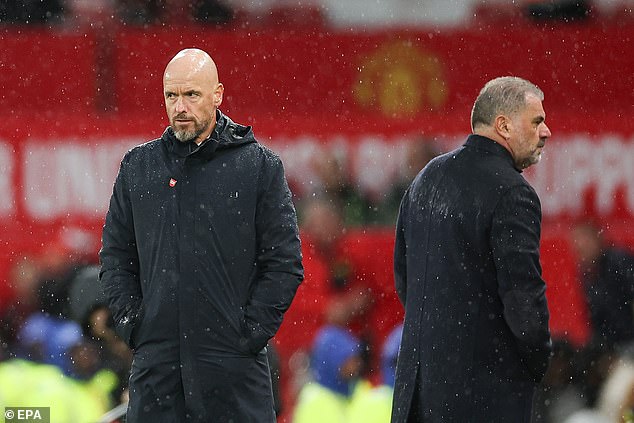
There is nothing ‘knee-jerk’ about potentially sacking Erik ten Hag (left) after Man United’s shocking defeat by Tottenham
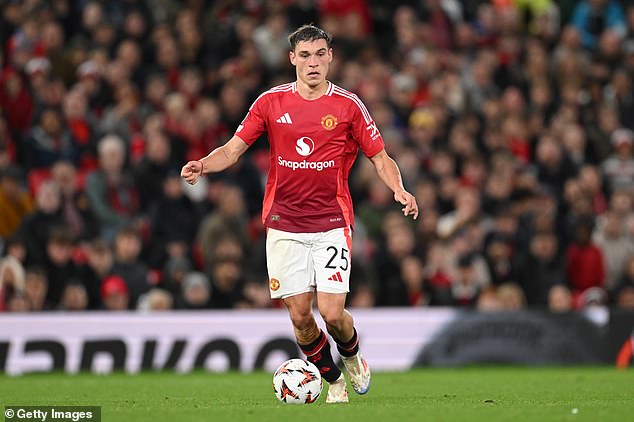
Manuel Ugarte made his first start on Sunday after joining and first impressions were not good

Ugarte’s struggles
Amid the many alarming aspects of Manchester United’s performance against Spurs was the display of new £50m signing Manuel Ugarte, who was making his first start after his move from Paris Saint-Germain.
Ugarte has been held up by many as the latest ‘last piece in the jigsaw’ at Old Trafford and he may yet prove to be a valuable signing. For now, though, let’s just say first impressions were not good.
Ugarte is supposed to be a holding midfielder par excellence but his main contributions on Sunday were trying and failing to get close to Micky van de Ven and Dejan Kulusevski.
United have been made to look like mugs before when they have bought cast-offs from the European elite – Bastian Schweinsteiger, Raphael Varane, Casemiro, Zlatan Ibrahimovic, and Cristiano Ronaldo (the second time) – all spring to mind. Let’s hope Ugarte is not the latest name on that list.
Copyright for syndicated content belongs to the linked Source link







